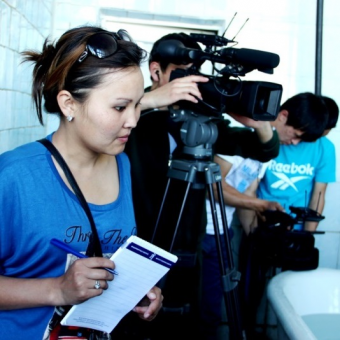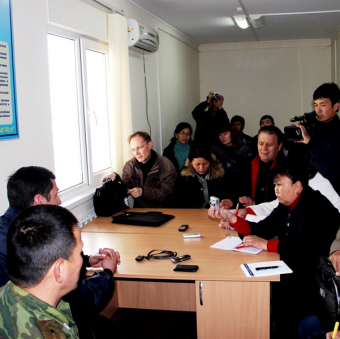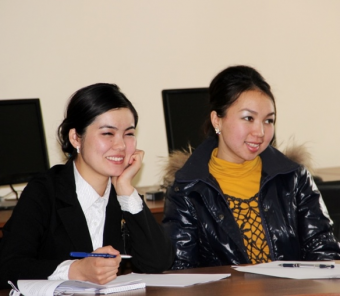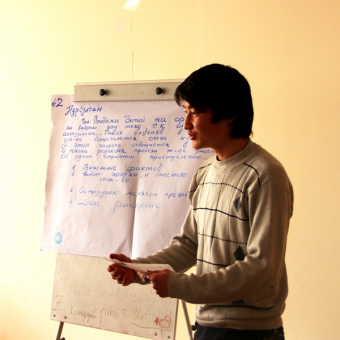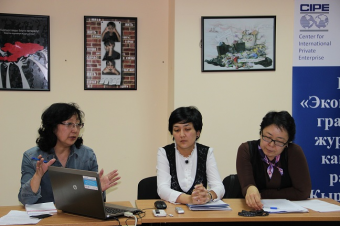Strengthening Understanding of Economic Issues in Kyrgyzstan (CIPE, 2013)
Strengthening Understanding of Economic Issues in Kyrgyzstan Project
Impementation: Development Policy Institute, Kyrgyz Republic (www.dpi.kg)
(Project Manager: Nurgul Jamankulova, +996 555 313385, 770 771711, njamankulova@dpi.kg)
Donation: Center for International Private Enterprise (CIPE)
Duration: November 2012 - November 2013
Coverage: all oblasts of the Kyrgyz Republic
Project objective:
- To raise media capacity to inform the public on market concepts.
Project activities:
- Building on a strong demand for education and high appreciation within the media community of the economic journalism educational seminar series conducted through CIPE/NED funding on recent years, CIPE will continue to support work with journalists to increase their understanding of key concepts, principles, and practcalities of market issues. Not only have the efforts to-date been successful in establishing a reliable pool of about 25 economic journalists in Kyrgyzstan, they have also contributed to an almost-doubling of economic- and business-related articles in the Kyrgyz press since 2010, according to DPI's analysis. Project-educated journalists publich articles on issues covered at the seminars and plan to continue to do so.
- This project will take on a three-pronged approach:
- Provide practical on-the-ground study tours for practicing journalists, with a particular emphasis on participating journalists in the outlying regions, that will serve as motivators and material-resources for media reporting on key economic topics.
- Nurture new and future economic journalists through university lectures.
- Increase informational awareness to the general public on key economic issues by strengthening journalists' understanding and appreciation of market-based democratic values, principles, and insitutions through informational seminars, a conference on economic freedom, and a website that offers information on these issues to journalists and the wider public.
Study tours will include, but not be limited to the following major destinations:
- Border customs post between Kyrgyzstan and China called "Torugart", known for its unpredictable schedule and customs officials' arbitrary decisions on passage of persons and goods.
Topic: How customs affect the economy in general and corruption in particular. - Major southern trading city Kara-Suu that serves as the main trading post between Kyrgyzstan and Uzbekistan.
Topic: Cross-border trade as a way to decrease conflict potential, reduce corruption, and stimulate the economy. - The largest gold deposit project managed by a Western (canadian) company in CA, the Kumtor gold mine, which contributes over 10% of Kyrgyzstan's GDP and is located in the Issyk-Kul region.
Topic: Distribution of resources and profits among investors, national wealth, job creation, and social responsibility of business. - Villages, such as Min-Bulak in the Naryn region and Mambetovo in the Issyk-Kul region, where close cooperation between local authorities and the business community have yielded successful models of public-private cooperation (positive examples), as well as the city of Karakol, where the local Association of Entrepreneurs suffers from the mayor (negative examples).
Topic: Relationship between local governments and entrepreneurs / business community and the role of this relationship in the quality of the business climate in the region.
Trips will include 15 journalists from around Kyrgyzstan (5 from Bishkek and 10 from regions), who will be selected by DPI based on the quality of their applications, level of experience, prior participation in project-based seminars, and potential for increasing / improving writing on economic topics. DPI will require journalists participating in the study tours to write / publish at least one article based on the tour.
Informational Seminars "Press Sessions" for Journalists:
As a rule, journalists receive information on economic subjects during press conferences and briefings. These are usually brief events which do not enable a journalist to get an adequate understanding of complicated economic information. Typically, Kyrgyzstan's journalists receive little economic education at school, at home or in their universities. Journalists are often dispatched to cover economic news with little understanding of the topic, failing to understand the context.
To continue educating journalists on business issues and key economic concepts, DPI will organize a series of 10 press sessions for 15 practicing economic journalists in each session. These press sessions will be open to participation to all journalists; however DPI expects that about half of the participants will have participated in previous educational seminars under CIPE/NED funding and that the participants in all 10 events will largely be the same journalists. Participants will receive certificates of completion after having attended at least 8 out of 10 sessions, as well as write and publish articles on the topics covered at the press sessions.
DPI will invite experts and practitioners to speak on topics that include, but will not be limited, to the following:
- Mining industry - how to divide the profit between business and local people
- How many local authorities interfere with economic development? How many local authorities contribute to the economic development?
- Business access to finances
- Agricultural development
- Labor market
- Cross-border trade
- Energy safety
- Protection of property rights - basics of economic development
- Statistics- how can journalists use it?
- Technical regulation or license? What should be the licensing system?
- What transportation solutions are needed for regional development in Kyrgyzstan?
- How to trade with neighbors legally and with no loss?
- What are the consequences of WTO accession for the regions of Kyrgyzstan?
- New media (internet-based) as a way to fight corruption (messages from citizens as material for journalists)
- Economic speech freedom on the internet
Nurturing New and Future Economic Journalists
Within this project, DPI and CIPE will focus on not only strengthening the qualifications of practicing journalists to report on economic issues, but also on promoting economic journalism to prospective journalists currently studying in universities. Students of Journalism faculties in Kyrgyz universities rarely obtain substantial knowledge on economics or have opportunities to communicate with practicing journalists to gain practical skills and perspectives to write knowledgeably on economic topics.
Typically, journalism students select areas of specializations such as sports or crime, but rarely business or economics. Even those who select economics lack basic knowledge in this area. This was an issue raised by practicing journalists repeatedly over the last few years at project related events. KSEPC has made several attempts to engage journalism students in the educational program in the past. However, recently journalism faculty deans, professors, and staff of three leading universities agreed to allow KSEPC I DPI to hold classes on campuses for students majoring in journalism and communication, i.e. prospective journalists.
DPI expects that approximately 30% on average of journalism I communications students will attend these lectures, if held on campus and incentivized with certificates. To this end, within this project, DPI will organize 10 lectures with 15 students (average age 20-21) at each lecture. The lectures will take place on the campuses of the Bishkek Humanities University, Kyrgyz Technical University and Kyrgyz-Turkish Manas University. The lectures will be led by Ms. Nadezhda Dobretsova of DPI and invited experts I practitioners depending on the specific topic.
DPI will encourage students to participate in the Press Sessions within this project (described above) in order to build professional networks and obtain mentorship from practicing journalists. DPI will provide certificates of completion to those students who participate in 90% of the lectures and have at least tried to write articles on topics covered at the lectures. The certificates will serve as an incentive for participation and as a means to strengthen their employability at local media outlets upon graduation from university.
DPI will develop and distribute a new Economic Journalism Guide that will help new economic journalists and journalism faculty to organize lectures with visiting experts and practitioners on their own in the future. This Guide will help address the following issues:
- Selecting topics for economic journalists;
- Selecting experts to interview and invite as lecturers; and
- Writing skills for economic journalists.
CIPE will work with DPI to ensure that this guide is translated into English to be used as a resource for economic journalists elsewhere in the region, such as Afghanistan, Pakistan, Moldova, Georgia, and Azerbaijan.
One-day Conference for Journalists on "The Role of Media in a Market Economy"
To advance appreciation for the role of the media in a market economy, as well as for the principles of economic freedom and democratic governance, DPI will organize a one-day informational event for journalists and policymakers who will be selected by DPI. The conference will take place as the last event ofthis project in the Fall of2013. DPI expects that participants will include 40 practicing and potential journalists in Kyrgyzstan, as well as members of the policymaking community, and will take place in an off-site location in the Issyk Kul region.
Speakers will include members ofCIPE's reformer network, such as Jaroslav Romanchuk (Analytical Center "Strategy," Belarus) and Emil Umetaliev (Bishkek Business Club, Kyrgyzstan), to lead discussions on the benefits of market-based democratic institutions, a comparative analysis of international indicators and models that support the benefits of economic freedom as a pillar of prosperity and stability, and the importance of entrepreneurship as a catalyst of innovation and employment creation. Mr. Romanchuk's work in Belarus to present an alternative viewpoint favoring market-oriented democratic values will be an important asset to this conference. Mr. Umetaliev is a well-known and highly respected business community leader in Kyrgyzstan advocating for market-oriented democratic reforms. In addition, CIPE's Moscow staff will present lessons learned in the Russian regions with positive examples of the media working with the business community to raise public awareness on important economic issues. Topics will be presented in accessible language easy to understand for Russian-language and Kyrgyz-language audience.
Website for Journalists and Public
Within the framework of the CIPE/NED-co-funded conference in October 2011 on "Financial Literacy and Economic Journalism as Factors of Stability and Poverty Reduction," DPI launched the website www.finliteracy.kg that hosts conference materials and follow-up events, if any. While currently this website is down, within this project, DPI will re-launch and restructure the website to serve as this project's informational website and a resource for journalists and the wider public on economic issues as they relate to the media. This website is not affiliated with a particular organization, but is a stand-alone informational forum. In previous projects, key materials that were stored on KSEPC's website www.press.kse.kg will be linked or moved to www.finliteracy.kg. This website will also offer links to relevant websites that provide information in support of economic freedom, democracy and importance of well-developed and well-functioning financial markets. The website will be available in the Russian and in Kyrgyz languages.
Final documents:
- 1Q Narrative Report
- 2Q Narrative Report
- 3Q Narrative Report
- 4Q Narrative Report
- 5Q Narrative Report
- Final Narrative Report
News:
-
20.05.2013 14:09Development policy institute within the project “Strengthening Understanding of Economic Issues in Kyrgyzstan” by financial support of the Centre of international private enterprise held press-tour for journalists of Kyrgyzstan to Osh and Jalal-Abad oblasts.
-
22.04.2013 09:5822 journalists and representatives of Media were invited to participate at that event.
-
15.03.2013 13:08Master-class for students-journalists,concerned to based incomes of country was hold on March 13, 2013.
-
14.03.2013 19:11Theme of economic crimes was discussed during the master-class for students of BHU.
-
07.03.2013 13:34Press-session, concerned to activity of Court of Auditors was organized on March 6, 2013.
Library:
-
08.05.2013 23:43According to Freedom House’s Freedom of the Press 2013 report, Kyrgyzstan’s media environment remains ‘not free’ with little improvement in press freedom over the last ten years.


